News & Media
Decolonising innovation: indigenous wisdom as a catalyst for African solutions
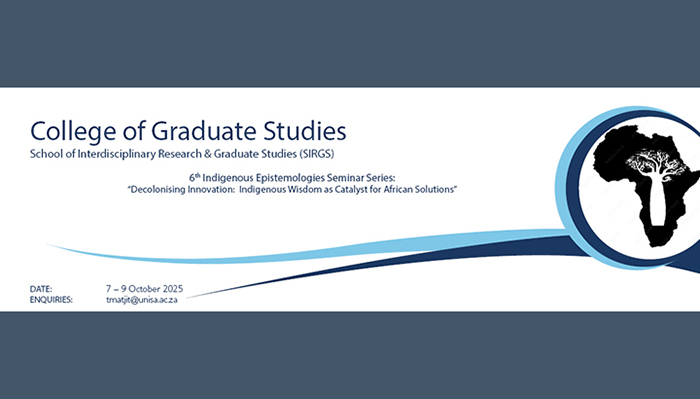
The School of Interdisciplinary Research and Graduate Studies (SIRGS) in Unisa's College of Graduate Studies (CGS) hosted its sixth annual Indigenous Epistemologies Seminar Series from 7 to 9 October 2025, bringing together scholars and postgraduate students from across Africa.
Timed to coincide with South Africa's Heritage Month, this year's theme, "Decolonising innovation: indigenous wisdom as a catalyst for African solutions", provided a dynamic platform for critical dialogue on the role of indigenous knowledge systems in shaping African futures.
The three-day virtual event drew strong participation from Ethiopia, Ghana, Uganda, Nigeria, and South Africa. Professor Patric Ngulube delivered the welcoming address, setting a collaborative tone for the proceedings.
Giving indigenous knowledge a "scientific passport"
Professor Malik Maaza, Incumbent of the UNESCO ITL/NRF Africa Chair in Nanosciences and Nanotechnology, challenged the continued marginalisation of indigenous knowledge (IK) in scientific discourse. Drawing on architectural achievements such as Great Zimbabwe and the Benin castles, Maaza urged scholars to "give IK a scientific passport", recognising it as legitimate scientific thought.
He illustrated his point with practical examples, including the Khoisan’s use of red ochre, which offers superior protection against skin cancer compared to many commercial products. He also referenced the late Dr Manto Tshabalala-Msimang's promotion of garlic and beetroot as treatments, once dismissed by pharmaceutical companies but now validated by scientific research.
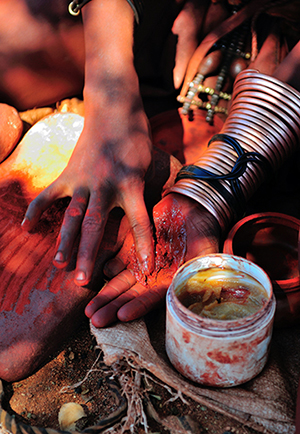
The Khoisan’s use of red ochre
Rethinking pedagogies of inclusion
Professor Anthony Brown from the CGS challenged Western pedagogical assumptions that equate stillness with learning. "In Africa, learning traditionally happened through movement and observation," he explained, noting that children from Khoisan communities are often misdiagnosed when they struggle to adapt to sedentary classroom models.
He introduced the Zulu greeting sawubona ("I see you") as a transformative pedagogical framework that values circular learning, oral traditions, and collective assessment. His presentation highlighted the "hidden curriculum" that often renders African students invisible within their own learning spaces.
Reconceptualising innovation and addressing psychological dimensions
Professor Mishack Gumbo from Unisa's College of Education explored how indigenous knowledge systems represent authentic forms of innovation despite being excluded from mainstream scientific recognition. Drawing on the scholarship of Chilisa and Smith, he called for a paradigm shift that involves "socialising the West" into alternative ways of knowing. He illustrated his point by referring to the mathematical and geometric sophistication of Ndebele art.
Dr Rossano Wells, Deputy Director of Unisa's Directorate of Counselling and Career Development, brought psychological perspectives to the decolonisation project. Drawing on Frantz Fanon's teachings, he emphasised the importance of self-knowledge in addressing the psychological legacies of colonialism. He expressed concern about the misalignment of the Diagnostic and Statistical Manual of Mental Disorders (DSM) with indigenous realities, arguing that decolonising innovation requires attending to the psychological dimensions of knowledge production.
Afrocentric renaissance and legal frameworks
Dr Lehasa Moloi from Unisa's College of Human Sciences challenged long-standing myths that diminish African intellectual agency, including the false notion that Africa "waited for Europe to liberate it". He advocated for culturally grounded measures of innovation, pointing to African New Year celebrations in September as a symbol of renewal and a reflection of uniquely African ways of organising knowledge.
Dr Victoria Adeleke from Unisa's College of Law highlighted Africa's demographic strength, noting that 75% of its population is aged between 15 and 35. "If we steer this group in the right direction, we can design the Africa we deserve," she said. Adeleke underscored the need for robust legal frameworks to protect indigenous innovations through copyright, patents, and trademarks, supported by stronger pan-African partnerships.
Science education and healing through education
Dr Amanda Simayi from Nelson Mandela University delivered a presentation on the disconnect between Eurocentric STEM education and rural African realities. She proposed an Africanised framework that embraces learners' cultural contexts, calling for a balanced dialogue between Western modern science and indigenous knowledge. "We must open our thought systems and reframe abstract science concepts through indigenous lenses," she urged.
Professor Nokuthula Hlabangane from Unisa's College of Human Sciences concluded the series by exploring how education can act as a healing force. Drawing on the Setswana concept of go aga motho ("building a human being"), she stressed that African institutions must provide genuine intellectual nourishment rather than inadequate substitutes. She invoked the 1976 Soweto uprising as a reminder of what occurs when students cannot see themselves reflected in the curriculum.
Moving forward: sawubona – I see you
This year's seminar reaffirmed the urgency of decolonising innovation and reimagining African futures through indigenous wisdom. Key themes that emerged included the need for robust legal protections for indigenous knowledge, curriculum transformation at all educational levels, coexistence with – rather than subordination to – the Global North, and the recognition of indigenous wisdom as a living source of innovation, rather than a historical artefact.
As Prof Brown reminded attendees: "sawubona – I see you." The seminar's success lay in creating a space where African knowledge systems are truly seen, valued, and integrated into scholarly discourse.
SIRGS remains committed to advancing indigenous epistemologies as pathways to epistemic freedom and sustainable development. Indigenous knowledge forms part of Africa’s collective heritage and is at risk of being lost if not actively promoted, protected, and prioritised within the continent’s academic and social institutions.
* By Hanli Wolhuter, Communication and Marketing Specialist, and Dr Tonny Matjila, Research Training Officer, College of Graduate Studies
Publish date: Mon Nov 17 14:42:52 SAST 2025


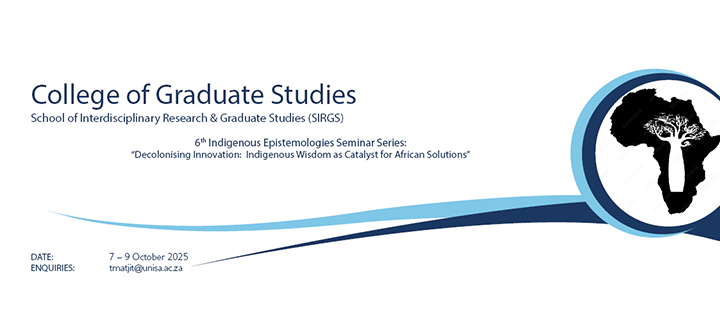 Decolonising innovation: indigenous wisdom as a catalyst for African solutions
Decolonising innovation: indigenous wisdom as a catalyst for African solutions
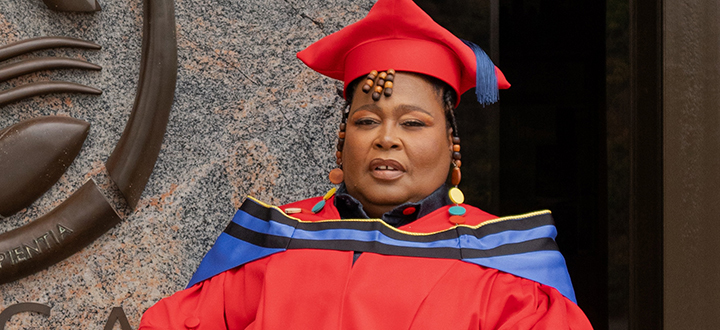 Unisa PhD graduate rises with dignity, and proudly lives with equity
Unisa PhD graduate rises with dignity, and proudly lives with equity
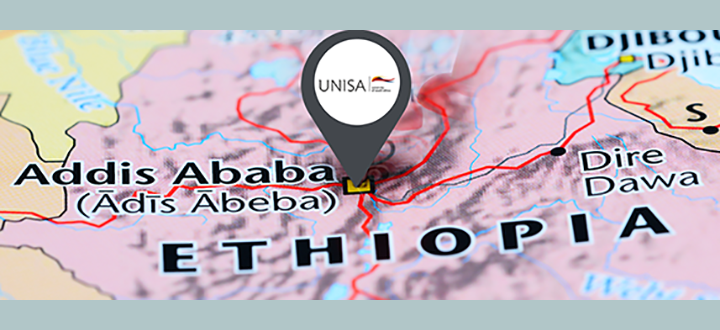 Unisa hosts successful virtual open day for 2026 Ethiopian admissions
Unisa hosts successful virtual open day for 2026 Ethiopian admissions
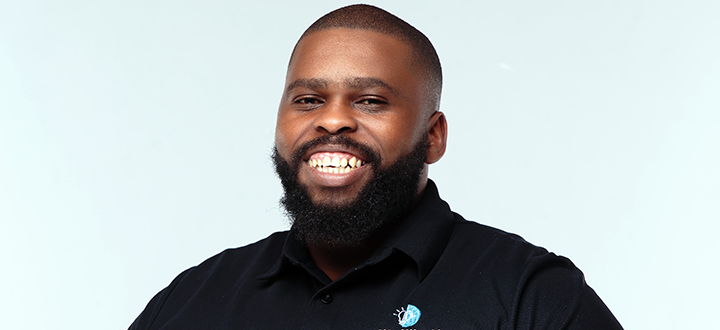 From unemployed graduate to business founder
From unemployed graduate to business founder
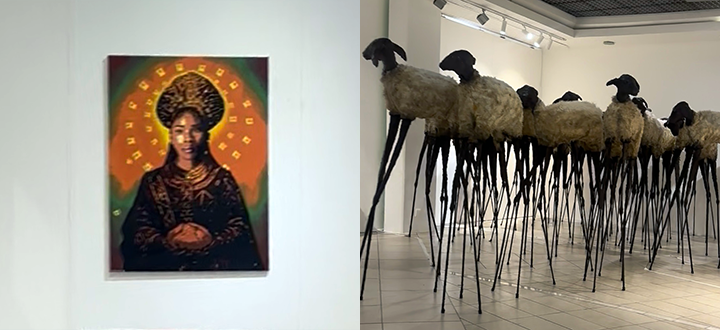 Multidisciplinary showcase set to celebrate the creative achievements of Unisa art students
Multidisciplinary showcase set to celebrate the creative achievements of Unisa art students